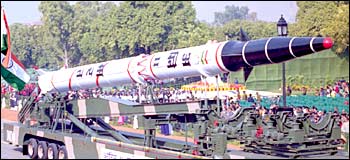
| 
| 
|
Home > News > Specials
The Rediff Special/Josy Joseph
'The retaliation will be within minutes'
May 12, 2003

Five years after the Pokhran tests shook the subcontinent, rediff.com examines how far India has come along the nuclear road. This is the first of a multipart series.
An Indian nuclear retaliation can only be authorised by the Nuclear Command Authority, which is controlled by the political leadership in New Delhi.
Observers see the politician's say in the matter as most reassuring -- given India's democratic foundations, it is most unlikely an impulse attack would take place, ever.
So what exactly happens if India, Indian forces, or an Indian ship comes under attack with a nuclear, biological or chemical weapon? How will India respond?
The weakest link in New Delhi's nuclear doctrine may be its ability -- or the lack of it -- to confirm in a matter of seconds whether the attack was nuclear, and if so, who was the perpetrator.
The time taken for a missile to travel from a Pakistani launch pad to a north Indian target, including New Delhi, is less than 10 minutes. But a senior military official said, "We do not have a 100 per cent porous-free radar system that can check all incoming missiles and planes."
What this means is, there will be a militarily unacceptable delay before the retaliation -- and India, officials said, will not launch a nuclear weapon without first verifying it has been attacked.
"We are concentrating on that [cutting down the delay to confirm]," a civilian bureaucrat said, "by strengthening our strategic communication networks and radar networks."
The government will also build a frontline radar system that can pick up any intruding fighter planes or missiles. The catch is, it will not be able to ascertain whether the missile/fighter is carrying a nuclear or conventional warhead.
If the attack is on Mumbai, the information could reach New Delhi through the intelligence network, the state government, the Western Naval Command or the Department of Atomic Energy.
The federal government would then confirm the attack through an alternative source. This, a senior bureaucrat in the nuclear loop said, could in all probability be the military.
"The confirmation time would vary depending on the target and the kind of attack," an army officer said. "For example if the attack is on New Delhi, we would have a swift confirmation and a retaliatory launch in a matter of minutes."
Once the attack is verified, the NCA comes into play. It has two components -- the political and executive councils.
The political council, chaired by the prime minister, has among its members the deputy prime minister, defence minister and external affairs minister. It is the sole body that can authorize a nuclear attack.
"The PC need not to assemble physically in New Delhi," said a source. "We are in the process of creating a network that will withstand even a nuclear attack."
For now, according to a military official, political council will need to depend "on existing networks, which includes satellite links through international commercial satellites such as Inmarsat."
Chaired by the national security adviser and comprising the chiefs of the Research and Analysis Wing and Intelligence Bureau, among others, the executive council will brief the political council.
"It provides inputs for decision-making by the NCA," said an intelligence official. "And it executes the directives given to it by the political council."
If, by chance, the political council is eliminated in the initial attack, India has an alternative chain of command, made up of specially designated constitutional authorities, to authorize retaliation.
According to a bureaucrat, there already are two national command centres capable of withstanding a NCB attack -- one in New Delhi and one outside, possibly in south India, both underground.
The government, he said, will also convert the prime minister's plane into a fully operational nuclear command centre, like the United States' Air Force One.
Meanwhile, the Strategic Forces Command -- with representatives from the Navy, Army and Air Force -- has begun work on an operations centre that can withstand NBC attacks. The command, which is now headquartered in New Delhi and headed by Air Marshal T M Asthana, plans to shift office soon – further away from the borders.
Once the political council orders retaliation, the EC conveys it to the SFC. The SFC is capable of executing the decision "within minutes" -- all it needs, a military source said, is time to mate the warheads to the delivery platform.
The Rediff Specials
Permission to reprint or copy this article/photograph must be obtained from rediff.com. Email reprint@rediff.co.in with your request.
| 
| 
 | Article Tools |  | |

 | Related Stories |  | |

 | People Who Read This Also Read |  | |

|